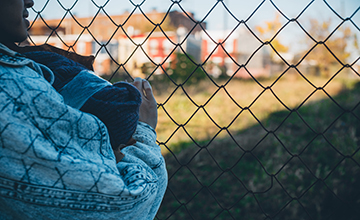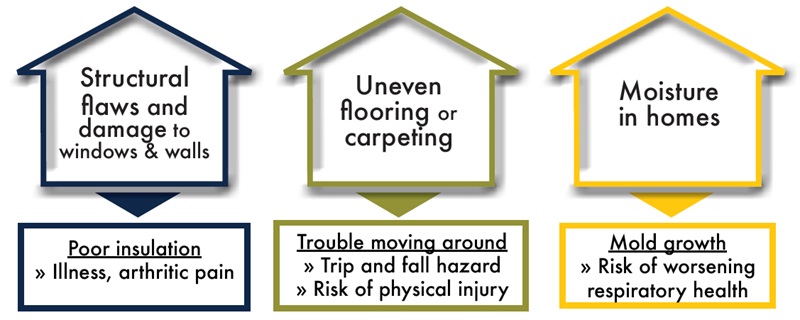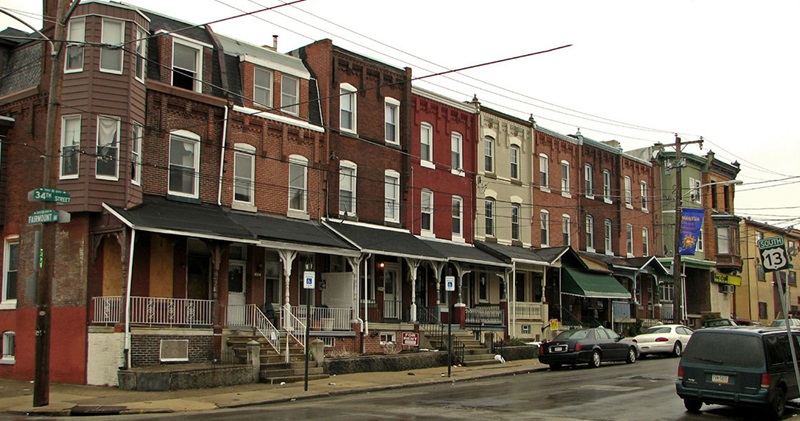Community Health Profile: Influence of the Home Preservation Initiative on Health Of Mantua Residents

Community Brief
January 2018
What is the Home Preservation Initiative (HPI)?
During a neighborhood planning process in 2010- 2011, home repairs and preservation were identified by residents as a critical need. The HPI, sponsored in-part by Philadelphia LISC, works with repair partners Habitat for Humanity Philadelphia and Rebuilding Together Philadelphia, and outreach and intake partners, People’s Emergency Center and Mount Vernon Manor CDC to provide home repairs for residents in Mantua, a neighborhood in West Philadelphia. They coordinate multiple services to deliver quality repairs in a more cost-effective manner.
The HPI aims to improve the safety, energy-efficiency and overall quality of homes for low-income residents of West Philadelphia. The overall improvement of the community’s housing stock helps to preserve affordable homeownership and improves quality of life by beautifying the neighborhood.
Why repair homes?
"The places where people live impact their health."
Living in poor housing may be associated with depression and weaker social relations. Physical health impacts may include reduced mobility, respiratory problems (such as asthma), and injuries.
How do we know if HPI made an impact?
The Drexel Urban Health Collaborative partnered with the HPI to help understand the experience of residents who received home repairs. The goal was to identify the ways in which their health and neighborhoods are affected by housing conditions and home repairs.
In-person interviews of 41 Mantua residents were conducted in June and July 2016. More than 70 percent of residents interviewed had lived in their home for more than 10 years (see page three for more details). Interviews included questions about residents’ perspectives of home and neighborhood; perceptions of their health due to their housing and neighborhood, and changes in quality of life or health resulting from the repair services they received.
What we learned from residents about how housing issues and repairs influence resident health:

Repairs to homes and removal of hazards reduced financial stress, improved pride in homes and improved residents’ mental health.
What are the effects of housing and house repairs on health?

Repairs led to the reduction of stress and improvement of mood, allowing participants to live comfortably in their homes. Some residents noted how neighborhood factors can impact individual health. Among those residents, almost all of them spoke about the negative effects of neighborhood issues on mental health.
Poor housing conditions, dilapidated buildings, and abandoned lots in the neighborhood caused residents to “feel depressed.” Violence, trash, drugs, and noise in the neighborhood also negatively affected their mental health. The majority of residents identified change and the need for change as important in their neighborhood. Residents said the HPI project has improved the physical quality of houses and thus improved their neighborhood overall. However, many noted that additional work is necessary to continue improving the condition of the Mantua neighborhood. Results will be used to support applications for more funding to continue serving neighborhoods in need and to support beneficial programs and policies to improve housing and health.
What HPI participants said about the program’s impact:
“Everything, especially the roof [affected health]. After the roof was done, it was a big difference. The rooms were warmer and [provided] the ability to be comfortable.”
“It has a strong impact. You come into a community and you don’t see a bunch of dilapidated buildings. It makes it more cheerful. It’s a pleasant neighborhood.”
“It was comforting that they came in and they refurbished a lot of homes in the neighborhood that needed work so I can say that it gave me some joy.”
“A lot of us can’t afford to get the houses fixed… maintaining a property costs a lot. Basic things, like piping or physical parts of the house, cost a lot of money. People don’t have that kind of money to pay out. It’s a good thing this program came along and helped us out.”
Teams of Dornsife School of Public Health students and Community Connectors from the People’s Emergency Center (PEC) conducted interviews with 41 residents in the Mantua neighborhood of West Philadelphia.
- Residents who were approved for or had already received home repair services between 2014 and 2015 were eligible to be interviewed.
- The in-person interviews took around 30 minutes to complete.
- Participating residents received a $20 Visa gift card for completing an interview.
- 76 percent of people who were asked to participate in an interview consented and completed the interview.
- 71 percent of residents interviewed had lived in their home for more than 10 years.
Acknowledgements
Special thanks to our study participants, collaborators and reviewers, especially Jenny Chen, Carolyn Placke, Carrie Rathmann and Stefanie Seldin. This brief was sponsored in part by our partners at Habitat for Humanity Philadelphia, Rebuilding Together Philadelphia, People's Emergency Center and Mount Vernon Manor CDC.
CITATION
Michael, Y, Tano, R, Chen, C, Barber, S, Carroll-Scott, A, Livengood, K. Influence of the Home Preservation Initiative on Health. Philadelphia, PA. Drexel University Urban Health Collaborative; Jan. 2018.